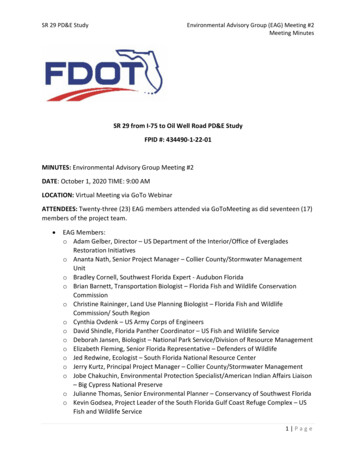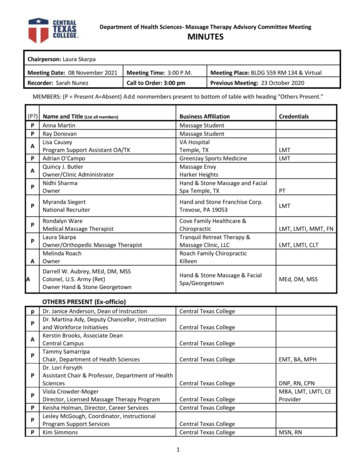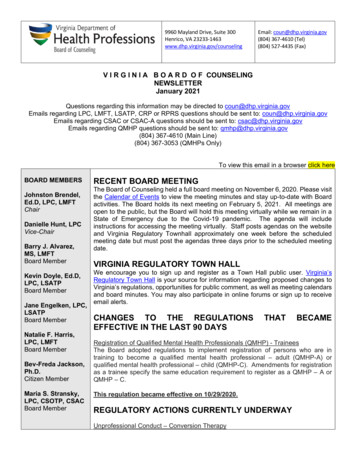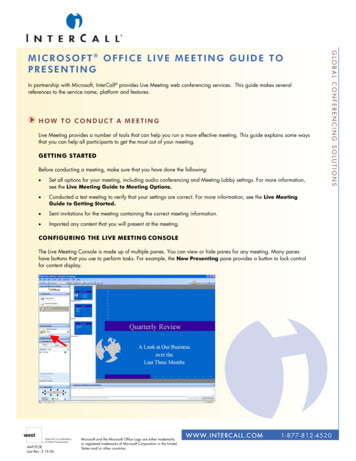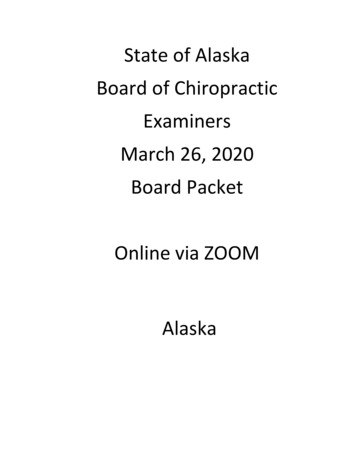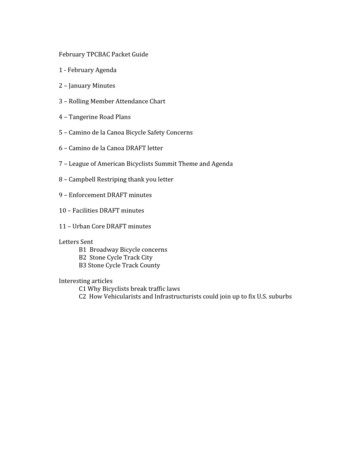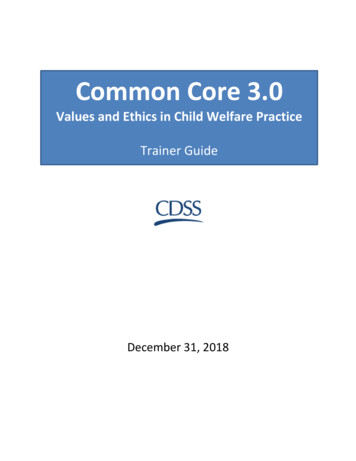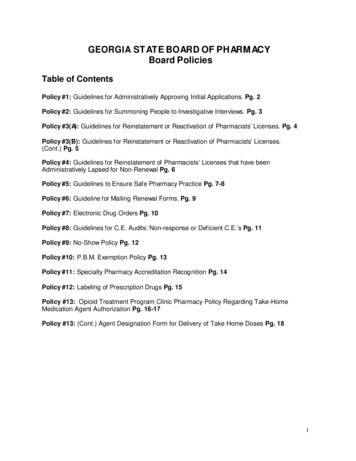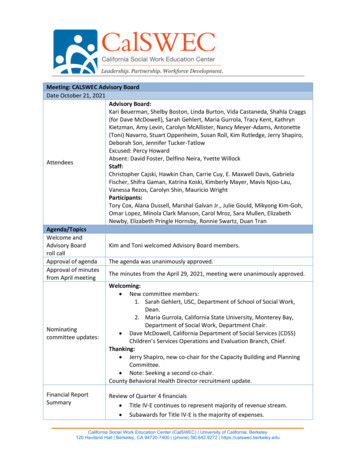
Transcription
Meeting: CALSWEC Advisory BoardDate October 21, 2021Advisory Board:Kari Beuerman, Shelby Boston, Linda Burton, Vida Castaneda, Shahla Craggs(for Dave McDowell}, Sarah Gehlert, Maria Gurrola, Tracy Kent, KathrynKietzman, Amy Levin, Carolyn McAllister, Nancy Meyer-Adams, Antonette(Toni) Navarro, Stuart Oppenheim, Susan Roll, Kim Rutledge, Jerry Shapiro,Deborah Son, Jennifer Tucker-TatlowExcused: Percy HowardAbsent: David Foster, Delfino Neira, Yvette WillockAttendeesStaff:Christopher Cajski, Hawkin Chan, Carrie Cuy, E. Maxwell Davis, GabrielaFischer, Shifra Gaman, Katrina Koski, Kimberly Mayer, Mavis Njoo-Lau,Vanessa Rezos, Carolyn Shin, Mauricio WrightParticipants:Tory Cox, Alana Dussell, Marshal Galvan Jr., Julie Gould, Mikyong Kim-Goh,Omar Lopez, Minola Clark Manson, Carol Mroz, Sara Mullen, ElizabethNewby, Elizabeth Pringle Hornsby, Ronnie Swartz, Duan TranAgenda/TopicsWelcome andAdvisory BoardKim and Toni welcomed Advisory Board members.roll callApproval of agendaThe agenda was unanimously approved.Approval of minutesThe minutes from the April 29, 2021, meeting were unanimously approved.from April meetingWelcoming: New committee members:1. Sarah Gehlert, USC, Department of School of Social Work,Dean.2. Maria Gurrola, California State University, Monterey Bay,Department of Social Work, Department Chair.Nominating Dave McDowell, California Department of Social Services (CDSS)committee updates:Children’s Services Operations and Evaluation Branch, Chief.Thanking: Jerry Shapiro, new co-chair for the Capacity Building and PlanningCommittee. Note: Seeking a second co-chair.County Behavioral Health Director recruitment update.Financial ReportSummaryReview of Quarter 4 financials Title IV-E continues to represent majority of revenue stream. Subawards for Title IV-E is the majority of expenses.California Social Work Education Center (CalSWEC) University of California, Berkeley120 Haviland Hall Berkeley, CA 94720-7400 (phone) 5l0.642.9272 https://calswec.berkeley.edu
Membership dues remain the same, as part of CalSWEC’s continuing,long-established partnership with county agencies.Note: Annual dues support necessary CalSWEC discretionary expenses.CalSWEC staffupdates, includingCOVID-19 impactsand innovationTitle IV-E Program Renewal of biannual contract with CDSS (in progress). Seeking to implement Tribal Social Services stipend program nextfall. Forthcoming (virtual) summit on Identifying the Impact ofIntergenerational and Racial Trauma in Child Welfare.Save the date(s):Job Fair - January 14Session I - February 9Session II - March 2Child Welfare In-Service Training Program Anticipating an amendment of 3-year contract for 21-22 Major curricular launches: Common Core July 2022, Supervisor Core20221. Dashboard reports provided real time data whichincludes: instructive insights, collating participant data andfeedback.2. Continued training: Father Engagement. September 2022 Fairness and Equity Symposium1. Outreach for participation to begin soon.Integrated Behavioral Health Program Received additional grant funding (September 2021 to 2025).1. Bay Area partner schools include California State UniversityEast Bay, San Francisco State, San Jose State, and UC Berkeley.2. Offering a centralized IBH seminar via CalSWEC for BHWETprogram attendees reflects state-wide prioritization ofworkforce development. Developing guide for community health centers to increase theircapacity to serve as MSW field sites (i.e. infrastructure for trainingplacements.)1. Aligns with priorities of HRSA.2. Roadmap for developing field training partnerships with localsocial work programs. Office of Statewide Health Planning and Development (OSHPD)offered final year extension for MHSA recipients to complete servicehours for repayment.Adults and Aging Program Concluded pilot project in June 2021, post-hoc evaluation to beconducted this year.1. Stipend program likely to be set up for FY 22-23 and 23-24.California Social Work Education Center (CalSWEC) University of California, Berkeley120 Haviland Hall Berkeley, CA 94720-7400 (phone) 5l0.642.9272 https://calswec.berkeley.edu
a. Capacity survey sent to MSW programs to assess theirexisting infrastructure, interest in training programs, etc.b. Plans are pending final execution of contract with CDSS.i.Anticipate receiving confirmation in January orFebruary 2022. Bay Area Social Services Consortium (BASSC) and Mack Center1. Assessment of (a) workplace policies and practices and (b)workforce needs in California Adult Services units areunderway to develop proposal for larger-scale project.Technology and Instructional Design California Child Welfare Training (CACWT) statewide LMS systemlaunched successfully in July 2021. Revamp of Common Core 3.5 included a revision of eLearnings,including increased accessibility measures. Virtual Home Simulation (“VHS”) originating from University of Utahis being piloted within California social work schools (i.e., Chico).1. Forthcoming update to VHS software. Virtual instruction and events1. Expansion of Zoom capabilities and add-ons to support virtualinstruction.2. Action item: stakeholders encouraged to share insights andcreative solutions to online and/or hybrid learning with ChrisCajski.3. Further development of CalSWEC website, which has yielded asignificantly high accessibility score and improved digitalcommunications (i.e., homepage refresh, updated factsheets).Center Director Updates UC Berkeley campus’ Fall 2021 return to in-person1. COVID 2.0 Ad Hoc Committee convened over the summer toexamine capacity. Provided briefing to California State Senate staffers regarding thebehavioral health workforce shortage with Steinberg Institute. Stakeholder engagements (aka - the “Reintroducing CalSWEC tour”)1. County Behavioral Health Directors Association of California(CBHDA)2. Met with Deputy Health and Human Services Secretary forBehavioral Health to explore potential funding opportunitiestargeted at addressing California’s workforce developmentneeds.3. Facilitation with Child and Family Policy Institute of California(CFPIC) for joint County Welfare Director’s Association (CWDA)and CBHDA.4. October orientation for new Advisory Board members.California Social Work Education Center (CalSWEC) University of California, Berkeley120 Haviland Hall Berkeley, CA 94720-7400 (phone) 5l0.642.9272 https://calswec.berkeley.edu
Committee reportsExecutive Committee Anticipates meeting virtually this spring. Hopes to return to in-person meetings next fall.Evaluation and Research CommitteeExamining Workforce Development, primarily regarding: Hiring and retaining employees (virtual vs. in-person).1. Opportunities for further research: workforce retention, WFHproductivity, and supervising from a distance. Lack of California data on workforce retention. Impact of hybrid work on both practitioners and clients. There is aneed to clarify what is meant by “retention” and how many peopleare leaving:1. Sense of connectedness and community.2. Considerations for women, Black, Indigenous, People of Color(BIPOC) social workers, etc. Discussion:1. Literature review, commissioned by Southern Area Consortiumof Human Services (SACHS) Directors last year that focused onunderstanding, motivating and engaging the youngerworkforce.2. Aligns with feedback in meetings with Federally QualifiedHealth Centers (FQHCs) – social workers need more training inhow to manage and supervise virtually, existing resourcesdeveloped by other fields.Policy and Advocacy Committee Development of CalSWEC land acknowledgment (planning on twoversions, long and condensed form). Forthcoming advocacy letter regarding repatriation of NativeAmerican remains. Proposed bill to California Governor to include essential status ofsocial workers, ensuring access to Personal Protective Equipment(PPE).1. Needs assessment survey for social workers to gauge impactsof title protection status. Association of Social Work (ASW) waiver (allowing for remotesupervision) set to expire without a plan for extension in October2021.1. Opportunity for further conversations regarding equity, access,and innovation.Capacity Building and Planning Committee Ad Hoc Committee: COVID 2.0 - Returning to Campus and theWorkplace.1. Originally meant to develop best practices around the postCOVID return of the workforce, resulted in generativeCalifornia Social Work Education Center (CalSWEC) University of California, Berkeley120 Haviland Hall Berkeley, CA 94720-7400 (phone) 5l0.642.9272 https://calswec.berkeley.edu
discussions around the “long-arm of COVID.”a. Inequities and impacts on women and BIPOCcommunities.i.Attitudes around renegotiating work, ongoinggaps in childcare services, etc.b. Realities of pandemic management.i.COVID adding 30-50% more work forsupervisors.2. COVID and social work education:a. Ongoing challenges organizing field placements forstudents with disabilities.b. Wide range of attitudes on the return to in-personinstruction among students and instructors.c. Underscores the importance of having ample fieldinstructors in agencies to support students.i.What is the professional developmentinfrastructure?ii.Which experiences should surround graduatecoursework?d. Are we observing a workforce retention issue or careerself-care?i.Recognition of the inherent responsibility forpractitioners to provide trauma-informed care.ii.Once in the field, reflecting on “what am Iactually doing as a social worker?”1. Evolution of jobs, job descriptions, andrightsizing expectations.2. ‘Is Social Work as fulfilling as I hoped?’ Aslife priorities shift, what does the field ofsocial work offer the people employedwithin it? How does it match initialexpectations around impact?e. Challenges regarding social work supervisors.i.How might we consider creative ways to increasecapacity as we seek to expand Social Workprograms, MSW education, etc.?1. Avenue for addressing field placementcapacity.Discussion Please see detailed notes below.Adjourn Next meetings:1. Winter Committee and Advisory Board – Thursday, FebruaryCalifornia Social Work Education Center (CalSWEC) University of California, Berkeley120 Haviland Hall Berkeley, CA 94720-7400 (phone) 5l0.642.9272 https://calswec.berkeley.edu
10, 2022 (via Zoom).Additional reminders:1. Thursday, April 28, 2022, meeting will also be held via Zoom.2. Schedule of 2021-22 meetings is posted.DiscussionStrategies forincreasing SocialWorker workforce,facilitated byDeborah Son,Executive Director,NASW-CA California Governor’s Budget dedicates additional funding to HealthCare Access and Information (HCAI) (formerly OSHPD) for increasingworkforce development capacity for behavioral health, namelypsychiatry and social work.1. Efforts projected to focus on development ofparaprofessionals (e.g. substance abuse counselors).2. Actively developing fact sheet of successful programs toincrease social work capacities, i.e.:a. Mental Health stipend program.b. Pupil Personnel Services Credentials (PPSC) program. Funding request to increase capacity of California’s social workeducation.1. Per review of California State Universities, state fundingallocation decisions tends to happen at the university level.2. Pilot program as an opportunity to address call for greatersocial justice in communities, leveraging existing presence ofsocial work professionals in behavioral health settings.3. Organizations could apply for funding for additional fieldconsultants/instructors.4. Possibility of internship stipends to offset costs incurred bystudents while in their program.5. Outreach at the community college level.a. Providing 4-year social work degrees may be interestingto California legislature.b. Need to identify key areas of expansion of programmingdirectly related to community needs (e.g. specialeducation teachers and social workers working togetherin schools).i.Considering and connecting pathways, especiallyin relation to paraprofessional workforce.ii.Need for greater diversity - both in terms ofsocial workers and faculty.1. Benefits of “stackable credentials,” or aladder of learning/career ladder approach.2. Linking to community colleges as inalignment with other policy initiatives.3. Community college students as morediverse student body.4. Strategies for supporting diverse staff oncethey are in the program (similar to SERVE’sCalifornia Social Work Education Center (CalSWEC) University of California, Berkeley120 Haviland Hall Berkeley, CA 94720-7400 (phone) 5l0.642.9272 https://calswec.berkeley.edu
Next Meeting(February 2022) work with Native American MSWstudents).Note: one-time funding would present a sustainability challenge.Examination of not only recipients of funding but the quality ofstudent practicum and development experiences.1. For example, Monterey building capacity in examining thework of promoturas in rural/Spanish-speaking farmingcommunities.a. Preparing students to serve in the communities wherethey are needed.2. Statewide, client feedback that the turnover in the internsproviding services is detrimental and retraumatizing to thefamily's healing and progress.a. Importance of direct exposure to members of thecommunity accessing basic needs services (e.g., informalvolunteering experiences).Families First Prevention Services lusionsSupport for:Requesting multi-year state funding allocation to improve the behavioralhealth workforce statewide. Ideally, this would include partnerships withcommunity colleges to support the social work training for paraprofessionalsin alignment with the needs of client communities.Action ItemsPay annual membership dues.Share insights and creative solutions to online and/or hybridlearning with Chris Cajski.PersonResponsibleAll, as applicableAll, as applicableDeadlineN/AN/ACalifornia Social Work Education Center (CalSWEC) University of California, Berkeley120 Haviland Hall Berkeley, CA 94720-7400 (phone) 5l0.642.9272 https://calswec.berkeley.edu
Oct 21, 2021
